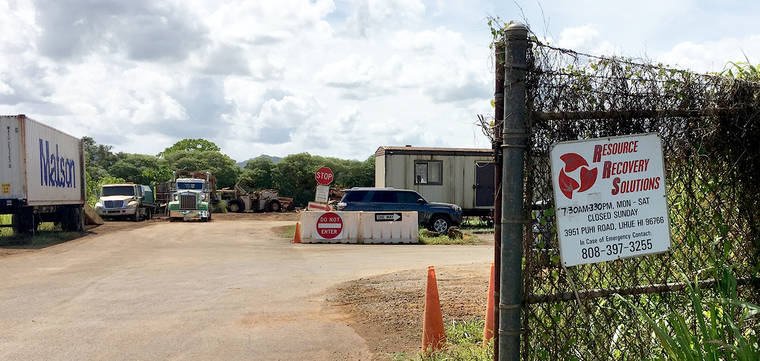LIHUE — New legislation that could potentially help mitigate the unsightly, rising issue of abandoned and derelict vehicles on Kauai was recently introduced by Mayor Derek S.K. Kawakami.
The bill for an act relates to the registration of vehicles.
It authorizes the director of finance to collect outstanding fines due to the towing, removal or disposal of abandoned or derelict vehicles.
In other words, if someone tries to register a car, they won’t be able to unless and until they have settled any outstanding debt.
The bottom line is that abandoned and derelict vehicles are a burden requiring costly cleanup that is being shouldered by taxpayers, Kawakami said.
“And quite frankly, we just don’t think that’s fair,” he said during a recent county council meeting.
The proposal is specifically related to cases where a vehicle identification number can be clearly traced to an owner and not for cases in which there is an “ambiguous situation” and it’s unknown who is at fault, he added.
“We truly believe that with this measure being passed, it would give us another tool in our toolbox to be able to cut down some of these abandoned vehicles,” Kawakami said.
While there is currently a mechanism in place where the Kauai Police Department sends a letter to the last registered owner of an abandoned or derelict vehicle, there is no enforcement when it comes to collecting outstanding fees, said Finance Director Reiko Matsuyama.
The bill would enforce the collection of fines on all abandoned vehicles going forward, as well as any past due fees, she said.
The expense incurred annually due to abandoned and derelict vehicles discarded on county property, which does not take into account payroll costs and the time it takes for personnel to deal with the matter, is more than $400,000, said Chief Todd Raybuck during a recent county council meeting.
Each vehicle costs at least a few hundred dollars to remove, but that number can climb to as much as $2,000, depending upon the vehicle’s condition and location, according to KPD.
Raybuck said that while there are “a lot of layers in the onion to peel back,” it’s time to “close loopholes and hold people accountable.”
Since the current system regarding vehicle registration is implemented by the state, the bill will now head to the Hawaii State Association of Counties’ executive committee for recommendation. It could potentially be included in the 2020 HSAC Legislative Package and the 2020 County of Kauai Legislative Package — two avenues in which the County Council can propose bills for an act at the Legislature.
Another bill to help mitigate the issue of abandoned and derelict vehicles on Kauai that was approved by the County Council that could also be included in either package pertains to increasing the “beautification” fee for rental car companies.
The fee, which is collected via registration dues, is used toward funding activities like the removal of abandoned vehicles.
One bill in reference to abandoned and derelict vehicles that was previously up for discussion but was not approved by the County Council is related to placing the responsibility of the transfer of vehicle ownership on the seller rather than the buyer.
The purpose of the bill was to help keep track of current owners, as some buyers neglect to register their vehicles or provide false information.
Efforts are still underway to find a solution to the registration process that would allow KPD to track down the current owners of abandoned and derelict vehicles.
One suggestion that Roger Ridgley, owner of A Tow in Paradise, proposed was that both the seller and buyer make arrangements to meet at the Motor Vehicle Registration Office to transfer ownership together, eliminating the possibility of fraud or “who owes what.”
Ridgley said he is often hired by private entities (not the county) to pick up abandoned vehicles. When he contacts the last registered owner, some are surprised to find out that the vehicle is still in their name.
A registration system that Raybuck said worked well was in the state of Nevada where he formerly worked for three decades.
Nevada drivers are required to remove their license plates when they sell a vehicle. Sellers simply provide their old plates to the Department of Motor Vehicles and a new one is issued to the buyer. It works because he said it ensures that people don’t drive off without insurance or proper registration.
“It prevents people from driving around and it also incentivizes current owners to get to the DMV,” Raybuck said.
A new proposal may be forthcoming as councilmembers work with KPD and the county’s Finance Department to iron out more details. If they can come up with something within the right time frame, it could also have the potential to move to the state Legislature if approved at a future council meeting.
•••
Coco Zickos, county reporter, can be reached at 245-0424 or czickos@thegardenisland.com.




